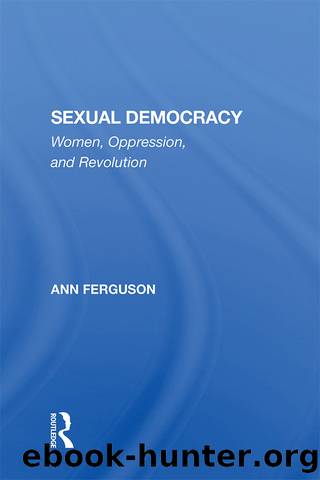Sexual Democracy by Ann Ferguson

Author:Ann Ferguson [Ferguson, Ann]
Language: eng
Format: epub
Tags: Social Science, Gender Studies
ISBN: 9781000311310
Google: aFyvDwAAQBAJ
Barnesnoble:
Goodreads: 46180401
Publisher: Routledge
Published: 2019-06-04T00:00:00+00:00
Building an International Lesbian Movement
What is the difference between the goal of building international lesbian, gay, and feminist movements and building cultures? My view is that those who see themselves as building a political movement are more able to tolerate value disagreement than those who see themselves as building a culture. Those who define their task as movement-building will tend to recognize the need for strategic and tactical thinking, which inevitably involves disagreements, experimentation, and changes in political positions as a result of perceived failures in the results of political actions. On the other hand, those concerned with culturebuilding will tend to fall into the pitfalls of identity politics. That is, they will emphasize the importance of symbolic unity in oppositional life-styles, rituals, social practicesâthe agreement on all values of the relevant oppositional communityâin order to validate a way of living alternative to the dominant culture.24
To avoid the weakening of potential sisterhood that lesbian vanguardism involves, we should conceive of ourselves not as building one unified lesbian culture but as building a plurality of lesbian cultures, each with its own set of self-definitions and each of which can, out of its reconstructed sense of its own interest, choose to involve itself with the lesbian and feminist liberation movements but none of which gets to define itself as "the" vanguard of that movement. Then, I hope, we will feel freer to disagree yet to support one another on general campaigns challenging sexism and heterosexism.
This point is even more important for international lesbian feminist politics. Capitalist development in the advanced industrial countries has permitted the rise of distinctive lesbian and gay oppositional subcultures and politics. The partial success of women's, gay, and lesbian liberation movements in some Western democracies, particularly in the United States, has given us access to institutional resourcesâacademic jobs, women's and gender studies programs, and support from parts of the political liberal establishment for gay liberation issues, especially recent education efforts to combat the homophobia connected with the AIDS crisis. We have won the political space for lesbian/gay pride marches on the national level and in many local spaces. The space of gay and lesbian research and some financial resources means that the international lesbian and gay academic conferences and political networks are dominated by Western gay and lesbian sensibilities, and even more by U.S. gay and lesbian consciousness. Not only does this tend to lead us to ignore differences in the histories of lesbian/gay politics in Western countries but to assume that Second and Third World countries should develop lesbian and gay countercultures and politics after the U.S. model.25
If, however, we are seeking to construct a democratic international women's culture, which is, presumably, the aim of international sisterhood, we must adopt a model that permits the self-determination of local and national lesbian cultures. Such a process supposes lesbian cultural pluralism and not a cultural imperialism. This presents the paradox for U.S. lesbian feminists: To avoid cultural imperialism we can only aid in the creation of such a culture
Download
This site does not store any files on its server. We only index and link to content provided by other sites. Please contact the content providers to delete copyright contents if any and email us, we'll remove relevant links or contents immediately.
The Rules Do Not Apply by Ariel Levy(4969)
On the Front Line with the Women Who Fight Back by Stacey Dooley(4873)
The Lonely City by Olivia Laing(4802)
Bluets by Maggie Nelson(4556)
The Confidence Code by Katty Kay(4260)
Three Women by Lisa Taddeo(3433)
Not a Diet Book by James Smith(3426)
Inferior by Angela Saini(3314)
Confessions of a Video Vixen by Karrine Steffans(3309)
A Woman Makes a Plan by Maye Musk(3254)
Pledged by Alexandra Robbins(3179)
Wild Words from Wild Women by Stephens Autumn(3153)
Nice Girls Don't Get the Corner Office by Lois P. Frankel(3044)
Brave by Rose McGowan(2823)
Women & Power by Mary Beard(2767)
Why I Am Not a Feminist by Jessa Crispin(2760)
The Girl in the Spider's Web: A Lisbeth Salander novel, continuing Stieg Larsson's Millennium Series by Lagercrantz David(2721)
The Clitoral Truth: The Secret World at Your Fingertips by Rebecca Chalker(2720)
I Who Have Never Known Men by Jacqueline Harpman(2670)
